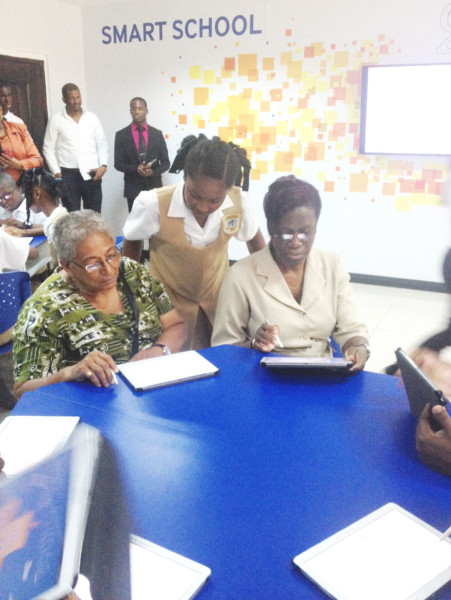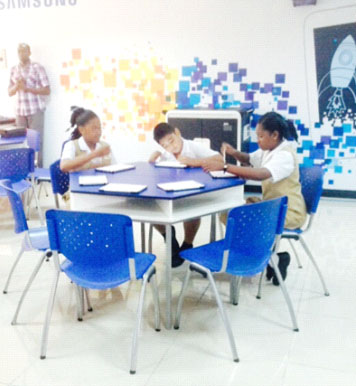Having undergone a multi-million dollar technological upgrade courtesy of Samsung Electronics, the North Ruim-veldt Multilateral is now the local pilot school for Samsung’s Smart School Project.
The project, which is the first of its kind in Guyana, is a collaborative effort of the Ministry of Education and the technology giant and involves the use of advanced technology in a special classroom to provide faculty and students with tools to share educational content in a more interactive way.
Addressing the launching of the project on Wednesday, Chief Planning Officer of the Ministry of Education Evelyn Hamilton said the North Ruimveldt Multilateral School was selected to be the pilot school for the programme because apart from the top five schools in the country, it performs exceptionally in the academic and extracurricular fields.
The project, introduced to the school under the leadership of the Glasswing International NGO, is serving 120 students at the Grade Seven level and six teachers, who now have access to 35 10.1 Galaxy Tablets, two laptops, a server, and a 75 inch smart TV. It will be focusing on the core areas of Science, Mathematics and English as it aims to align its programmes with the Ministry of Education. It is expected to last one year, during which a continuous assessment will be done to determine whether or not the Ministry will move to expand the project into other schools across the country.

According to acting Head Teacher Corwin Barnes, the project has since “given life to new relationships between students and teachers where interactive and creative thinking is encouraged.”
The project, which is estimated to cost close to US$40,000, includes teacher training, performance monitoring, installation and maintenance of digital classrooms in participating schools and the use of reading comprehension software Progrentis.

It also provides features that would help teachers manage their classrooms and increase student participation, such as screen monitoring to track students’ academic progress, private tutoring programmes oriented to each student’s comprehension level and lesson toolbars that allow teachers to effectively apply various applications through the Samsung School interactive lesson functionalities.
The programme also includes a volunteering component to encourage students to participate in extracurricular activities, such as recreational events, theatre, music and other initiatives that help to accelerate the development of multiple skills.
The Smart School project is currently underway in Aruba, Costa Rica, Ecuador, Guatemala, Panama, Nicaragua, Honduras, El Salvador, Venezuela, Dominican Republic, Jamaica and Trinidad and Tobago.
Head of the IT Department at the Ministry of Education Indar Singh noted at the launch that the project would place North Ruimveldt Multilateral on the leading edge of technology among public schools across the whole country.
According to Singh, classrooms should use technology to facilitate learning across all grade levels. However, he noted that this cannot be facilitated simply through an Information Technology lab in schools. Therefore, the need to use technology that is more mobile and more adaptable is required. Singh said the initiative affords the ministry an opportunity to pilot the project within the education sector and he highlighted plans to provide the technology that teachers can use in the classroom as well as a project that will see all the Grade Seven students of eight pilot secondary schools benefiting from tablets aimed at helping them in Mathematics. This project is expected to be carried out under the Ministry’s Secondary Schools Improve-ment Project.
For Deputy Chief Education Officer Marcel Hutson, the collaboration between the Ministry of Education and Samsung to implement the project is a testimony of the forward thinking of Minister Rupert Roopnarine and other officials as it relates to “where we need to go and what we need to embrace in the delivery of education in the 21st century.”
According to Hutson, international studies have shown that Information Communication Technology (ICT) integration in schools facilitates the acquisition of “high order thinking” skills by providing cognitive scaffoldings for students as they make sense of the information gathered. It, therefore, allows teachers and students to communicate thoughts and interests in subject matters as they explore the connections between concepts and ideas.
Against this background, the project is expected to help students to be more motivated and become more creative when they face new learning environments. “…ICT in classrooms is responsible for our children being more fruitful as ideological tools and it would provide a new framework to enhance teaching. The crux of the matter is that this is the time for us to embrace this kind of initiative and in doing so we can only see Guyana advancing in terms of education delivery,” Hutson stated.
“For education and delivery to be effective, it is no secret that there must be a joint juncture of the school, home and community and the fact that Samsung has come on board to join us in the delivery of education, it is commendable,” he added.
Meanwhile, Nicole Orillac, Citizenship Manager for Samsung Electronics in Latin America, expressed happiness at seeing Samsung being able to enable a special classroom for the programme aimed at offering a brand new e-learning experience to the students of the school.
“With Smart School, we seek to contribute to the educational processes of the country, accelerating the adoption of technological tools in the classroom and developing interactive digital content to enrich the current methods of teaching and learning,” she said.





